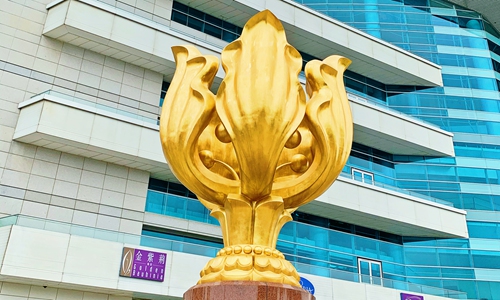Young people from Chinese mainland and Hong Kong get closer through social media
By Chen Xi Source:Global Times Published: 2020/4/8 15:13:40

The Golden Bauhinia Square in Hong Kong Photo: Courtesy of Chris Au
As an increasing number of young people in the Chinese mainland and Hong Kong have taken to social media apps such as TikTok, mutual understanding and communication between the two groups has been increased.Chris Au, a 24-year-old Hongkonger from Tuen Mun town in the city's New Territories, opened an account on Douyin, the China region version of TikTok, in March. Since then, he has posted many videos about the daily lives of young people in Hong Kong and quickly gained 54,000 followers.
"I was very surprised when I saw so many people follow me since I did not have any expectation when opening the account. I have received a lot of encouragement from my followers, which made me feel that I need to take more responsibility to do this job well," Au told the Global Times.
He noted he was very pleased that he has followers and friends in each province of China, with many giving him a lot of interesting feedback. One of the most meaningful responses was from a high school student in Jinan, East China's Shandong Province.
"He wrote a letter to me saying the compatriots in the mainland and Hong Kong should not be hostile to each other but united and work to improve together. He encouraged me to continue making videos and contribute to eliminating conflict between the two sides," Au said, adding that the message from a teenager gave him a sense of fulfillment.
As a graduate from Guangzhou University in South China's Guangdong Province, Au said what he saw and experienced in the mainland was very different from the news reported by some Hong Kong media outlets.
"The media, as a transmitter of social information, should uphold an objective and impartial attitude. However, some media exaggeratedly report the mainland's disadvantages, increasing Hongkongers' disdain for people in the mainland," Au said.
"Young people in the mainland are very qualified, polite and have their own thoughts. They gave me a warm welcome and offered me a lot of help when studying at the university," he said, adding that he is considering working in the mainland as it is a huge market with a lot of opportunities and potential.
According to Au, young people from Hong Kong and the mainland are all hard-working, motivated and have the same sense of humor. Differences are apparent when dealing with tasks, his friends from the mainland are more rigorous and down-to-earth while friends in Hong Kong are more open-minded and proactive.
Au noted that after joining TikTok, the most popular topics that his followers in the mainland have asked about have been shopping, traveling and dining in Hong Kong, and sometimes political topics are also discussed.
Au said that he hopes young people from the mainland can change their views about Hong Kong and that his videos can spread more positive energy. He also revealed that he hopes to become a full-time tourism blogger one day, traveling around the mainland so he can share his videos with his friends in Hong Kong.
Au isn't alone in his aims to eliminate prejudice between the two sides. A young medical worker in Hong Kong surnamed Liu has dedicated her TikTok channel to talking about social issues in Hong Kong including difficulties in affording accommodation, welfare policies and medical care.
However, unlike the full support Au has received from his followers, Liu said she had to work through a period in which she was misunderstood before gaining support online. She explained that as a medical staff, she needs to wear a face mask when making videos at her work place, which led to some netizens in the mainland thinking that she was a protester. Fortunately, after she explained her reasons for wearing a mask, her channel became more accepted. She currently has 393,000 followers on the China region version of TikTok.
Liu told the Global Times that she opened the account in September 2019. At the time, the Hong Kong protest movement was directly in the global spotlight. Some Hong Kong protesters who noticed her videos began attacking her online since her videos were favorable to the mainland. Some protesters even went so far as revealing her private information, including her work address as well as the names of her family members and colleagues, on the internet, which caused her no small amount of trouble.
However, Liu said she is not going to give up on making videos in the hopes that she can one day build a bridge between the mainland and Hong Kong. Liu pointed out that many prejudices start from a lack of communication and that young people in both places need to communicate more.
"I hope to see the day that the barriers and prejudices [between the mainland and Hong Kong] are eliminated," she said.